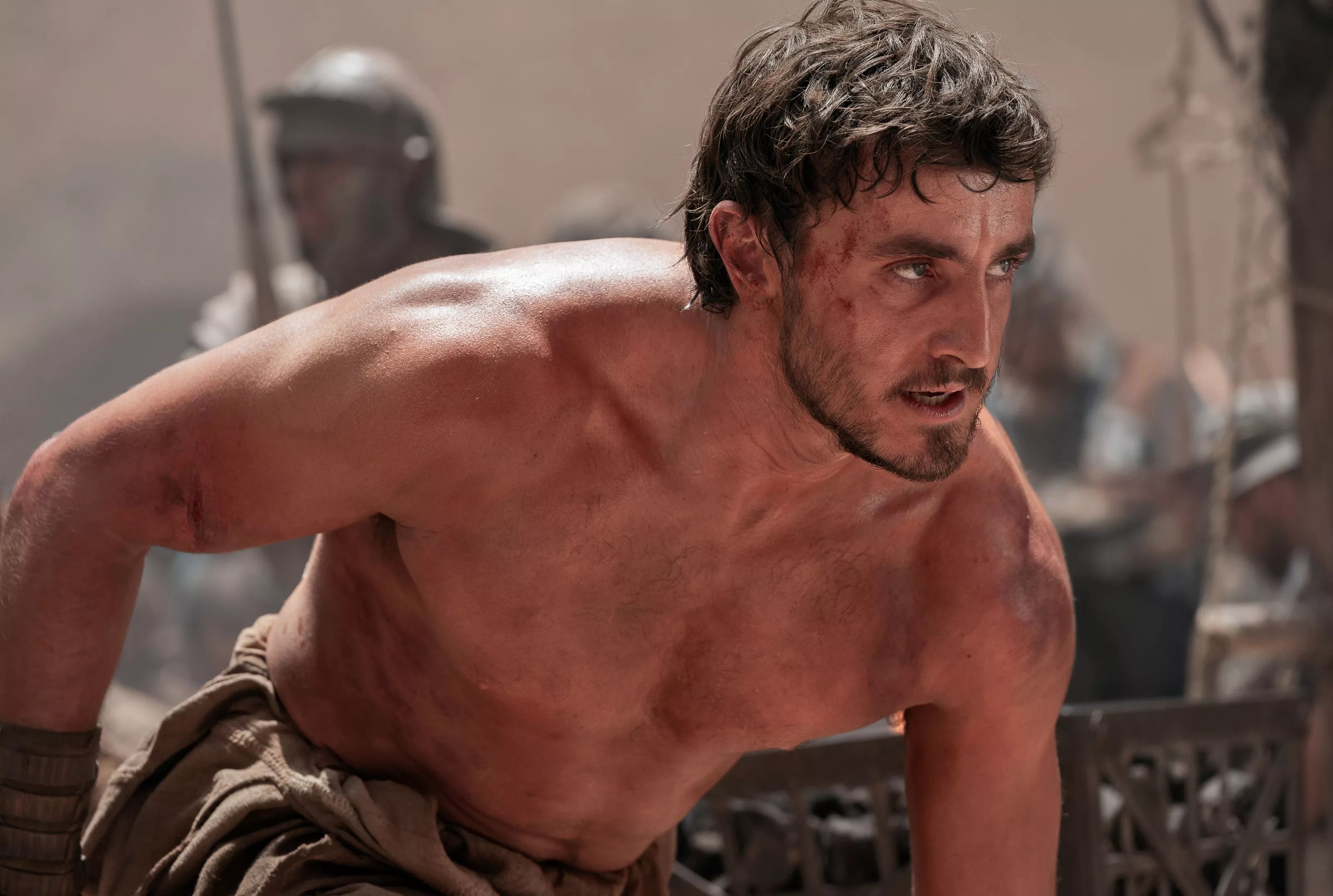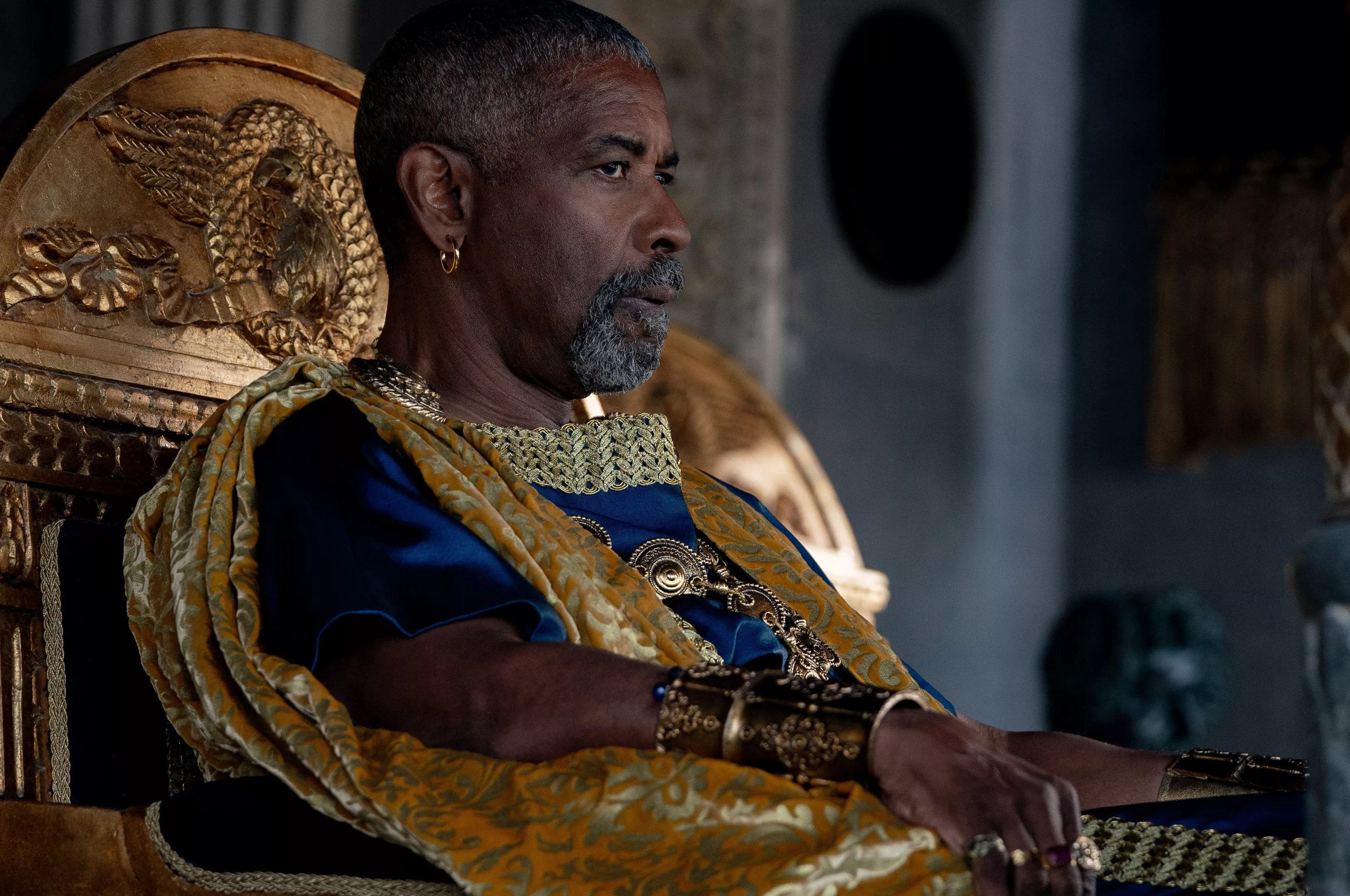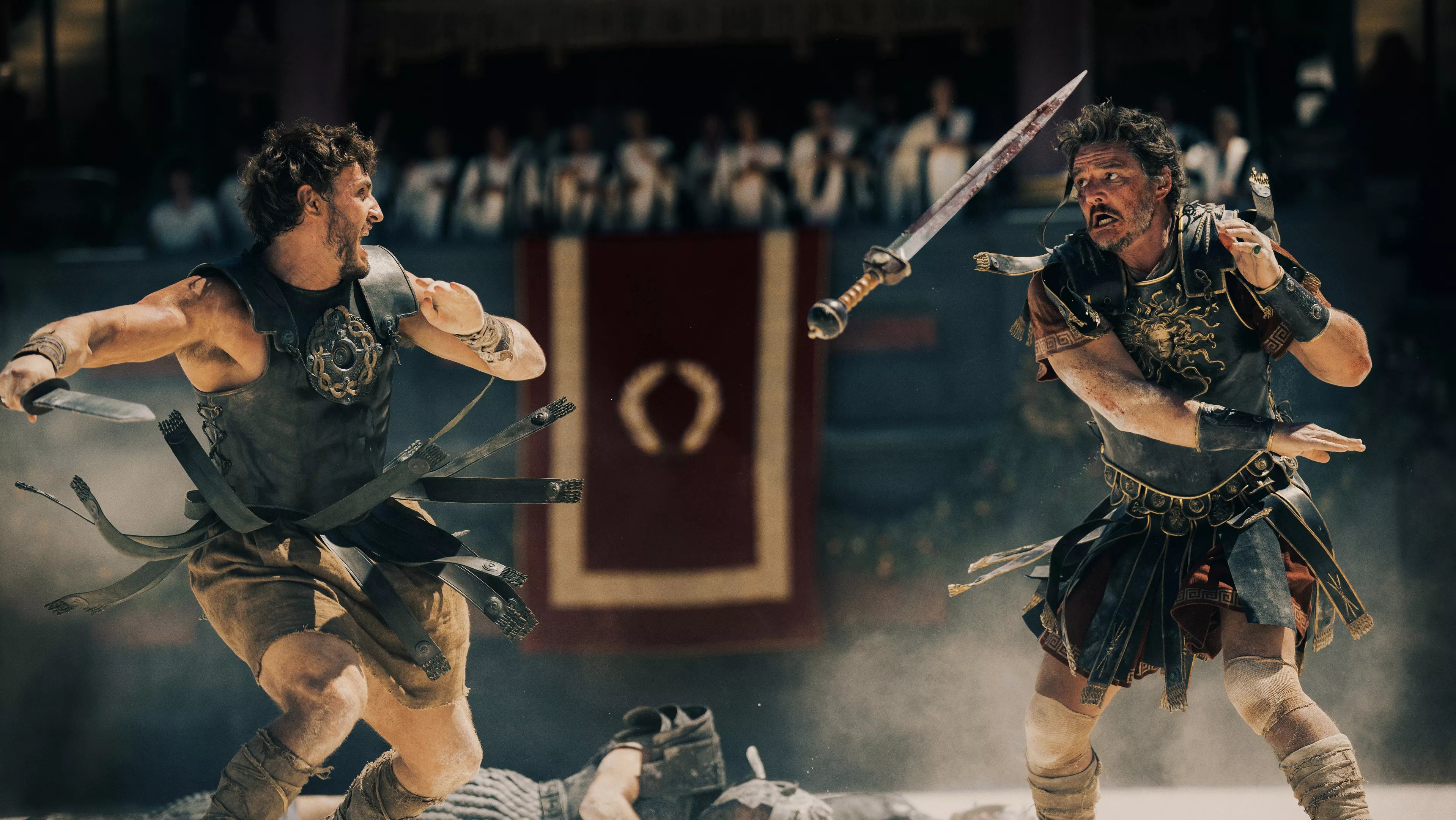
Paramount Pictures photo

Audio By Carbonatix
It feels appropriate that Gladiator II should start with a highly symbolic callback to the original film. The 2000 sword-and-sandal epic opened with the now-iconic image of Russell Crowe’s fallen warrior Maximus running his hand through a field of wheat. In the sequel, the first shot the audience sees is of a handful of grain. The wheat has been harvested; a new season has come, and a new generation with it.
The grains are held by Lucius Verus (Paul Mescal), son of Maximus and Queen Lucilla (Connie Nielsen), daughter of slain Roman emperor Marcus Aurelius. Having been sent away from Rome as a child after Maximus’ death, he lives in Numidia under the alias “Hanno.” But the empire comes knocking, and in one short battle, he loses his wife – a fellow warrior slain in combat – and his freedom. Swearing vengeance against the conquering general Marcus Acacius (Pedro Pascal), he is recruited by Macrinus (Denzel Washington), an ambitious gladiator stablemaster and arms dealer to the Roman legions who grants the enslaved warrior a bargain: Give him glory in the arena, and he will bring him the general’s head.
Director Ridley Scott is no stranger to second acts. He’s shepherded his iconic Alien franchise through two reboots, first in 2012 with the prequel Prometheus, then again this year, producing Fede Alvarez’s contentious Alien: Romulus –which I enjoyed, with reservations. However iconic the original Alien may be, Gladiator was, commercially and in terms of prestige, his finest hour. The film earned $465 million worldwide and won five Academy Awards, including Best Picture. However spotty his reputation has been as of late – deservedly so for misfires such as last year’s glowering Napoleon and the cartoonish House of Gucci – Scott seems to understand that this film is not just about Gladiator‘s legacy but also his own. And so, like a fighter getting a second wind, he’s returned to form, making sure that Gladiator II stands up to, and in some ways surpasses, its predecessor.

Denzel Washington as Macrinus in Gladiator II
Paramount Pictures photo
This year, make your gift count –
Invest in local news that matters.
Our work is funded by readers like you who make voluntary gifts because they value our work and want to see it continue. Make a contribution today to help us reach our $30,000 goal!
For one, the film actually has color. The original Gladiator was part of a wave of films that ushered in Hollywood’s addiction to muted pallets and muddy visuals, a trend that Scott carried through all the way to the utterly bleak cinematography in Napoleon. Thankfully, he’s finally corrected course here, depicting Ancient Rome in all its sun-drenched grandeur. That visual clarity extends to the action, which is more clearly shot and edited. Battles are more frequent than in the original. We feel the impact of every sword stab and arrow hit much more viscerally. We watch with glee, as if spectators in the Colosseum ourselves, as rhinos slam into arena walls and sharks lash at unlucky gladiators who fall into the water during a mock naval battle. It’s all so thrilling that you can forgive some of the unfortunately obvious CGI and the shameless historical inaccuracy, down to an English inscription above an important shrine to a past warrior.
That feeling of witnessing the gladiator games ourselves serves the film’s somewhat clunky central metaphor. Rome, of course, is America, and Marcus Aurelius’ egalitarian dream for the empire has vanished, just as our own country has lost its way. In the original film, spectacle served as a distraction from politics, an analogy appropriate for the age of Monica Lewinski and O.J. Simpson. In the era of Trump, however, politics has become a spectacle, so the film concerns itself with decadence as a symbol of imperial decline. Rome is now ruled by a pair of fatuous, pale-skinned, fair-haired twin emperors, the forceful Geta (Joseph Quinn) and the syphilitic numbskull Caracalla (Fred Hechinger), who order endless “games and executions.” Enslaved gladiators gamble their lives in the arena for a chance at freedom. Politics are settled in backrooms, with plots against bloody plots taking advantage of the brothers’ dulled faculties as factions conspire to usurp the Roman throne. Acacius leads one with Lucilla, and his arc ends in a battle that recalls another Pedro Pascal character’s fate in Game of Thrones.

Paul Mescal as Lucius and Pedro Pascal as Acacius in Gladiator II
Paramount Pictures photo
Yet, of these dueling powers, it’s Macrinus and his lust for power that prove the most dangerous. Washington’s highly anticipated role in the film as the flamboyant power broker and one-time enslaved person does not disappoint. The veteran actor chews the scenery with aplomb, twisting Marcus Aurelius’ Meditations into his own philosophy of the strong dominating the weak and facing off with the willful Lucius, for whom he serves as a mentor and adversary much as Oliver Reed’s Proximo did for Maximus in the original film.
Mescal’s role here has also been heavily hyped. The film is seen as a critical leading-man test for the heartthrob Irish actor, whose most impressive performances until now have been in sedate, subtle dramas such as Normal People and Aftersun. He also has the misfortune of being compared to Crowe, whose turn as Maximus (“father to a murdered son, husband to a murdered wife”) is the definition of iconic. Yet Lucius has different motivations. He resents Rome for ruining his life, yet he still recalls Virgil’s poetry from his patrician boyhood: “The gates of hell are open night and day/Smooth the descent, and easy is the way.” As much as Mescal emulates Crowe’s quiet intensity, there is certainly something else to his performance, a rageful viciousness all his own that draws more readily on the character’s lost years and forsaken past.
Just as Maximus pledged to “win the crowd” in the original, Gladiator II is a film that’s hard not to be won over by; even its most shameless callbacks to the first movie can’t help but feel stirring by the end. It would be a fine film for 86-year-old Ridley Scott to finish with, an affirmation of his legacy and a reminder of his filmmaking prowess. Except it won’t be – for better or worse, he’s already planning Gladiator III.
Gladiator II. Starring Paul Mescal, Pedro Pascal, Connie Nielsen, and Denzel Washington. Screenplay by David Scarpa. Story by Peter Craig and David Scarpa. Directed by Ridley Scott. 148 minutes. Rated R. Opens Friday, November 22; check for showtimes at miaminewtimes.com/miami/showtimes.